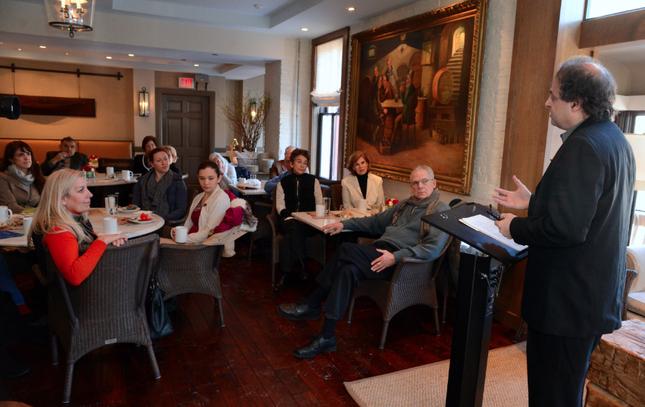After Theater J, Ari Roth Widens Vision With Mosaic
By • March 11, 2015 0 1254

For a man who had just gotten back from New York at two in the morning, and who was in the midst of starting up a new theater company just a little bit above from the ground up, Ari Roth was remarkably chipper, succinct, eloquent and upbeat, as he addressed a hardy group of audience members who had gathered the morning of Feb. 19 at the George Town Club for the year’s first Cultural Leadership Breakfast, presented by the Georgetown Media Group.
There were no signs of a lack of sleep syndrome, no lack of ideas and debating points, no lack of charm, no lack of energy. Soft-spoken and articulate, Roth was looking ahead to the future with a fistful of thoughts and ideas about not only the future of his new Mosaic Theater Company of D.C. but about his 18-year tenure as artistic director of Theater J—part of the D.C. (Jewish Community Center) on 16th Street, its accomplishments and the abrupt end of his stay there In December when he was fired for what the JCC’s chief executive Carole Sawatsky had called “insubordination.” Roth himself at the time said he was “terminated abruptly.”
The firing was highly publicized in the press, which detailed battles that seemed to be as much about international politics and Israel as it was about theater and plays, including controversial offerings like “Return to Haifa” and the Voices of a Changing Middle East Festival, which the JCC had cancelled.
“I have never been through a divorce,” Roth said. “But that’s what the experience of leaving Theater J felt like. There’s shock. There’s the fact, there’s loss—leaving behind a great group of staff members who were caught in the middle, leaving behind, in a way, all the years there, and what we—all of the people who worked on the plays, our initiatives there and starting over.
“But you know, while things got a little acrimonious, I think it’s also an opportunity,” Roth said. “That’s what you do after a divorce, you move on. They’re actively conducting a national search for a new artistic director. I’ve got an office at the Atlas Arts Center, where our new theater will be situated. We’re fund raising. We’re looking for new plays, which is why I was in New York, among other things. I think both parties have moved on. We’re dating.”
“I can tell you this—we will, I believe—be in a position to start our first season in November—we’re looking at new plays, including a play about Rwanda. I’ve been spending a lot of time the past few months finding the meaning in what happened.
“You know, I think there was a time there, when you felt as if you were in a play, a kind of participatory melodrama, you were a character in a drama, sort of a meta-play,” Roth said.
“It’s not that easy, leaving people and things behind—I was, as director of Theater J, part of an institution, informed by artistic vision, but also being part of collaboration. All art is collaboration, even novels and poems have editors and publishers.”
Roth recalled that Theater J had had its beginning in a small, small space in a home that offered 25 seats. At that time, Roth considered himself a playwright, wondering what his next play was going to be about.
“When Theater J expanded into the JCC with a much, much large theater, they offered me the job, and I saw a potential there. But being that makes you someone different,” he added. “You’re part of a much large creative eco-system—the theater itself, the center, the city theater community and establishment and even nationally.”
What Roth accomplished there—theater with a decided Jewish viewpoint coming from a rich Jewish culture—was often remarkable in the sense that many of the productions which were specifically Jewish found a universal audience.
Roth added things, coming from his own views and growth. “It’s funny, that the Voices of the Middle East Festival was originally called Voice of a Changing Israel festival, but I saw that so much was going on in the Middle East, and the city as well. The focus enlarged, became expansive. We, with the help of Andy Shalal, who is from Iraq, a Peace Café component, and increasingly, the plays started to include elements that were not purely confined to Israel. That is the way things are. It’s reflective of a debate going on among Israel supporters in the United States, and in Israel itself.”
The Mosaic Theater Company is not going to be Theater J, he said. “It will still have a Jewish viewpoint and component, but it will be much more international in scope, reflecting what is going on in the world, but also it will be be concerned with our own surroundings—our neighborhoods, and the changes there, 14th and U, Northeast, Anacostia, Dupont Circle and so on.
“I was very curious for instance, about who complains about parking,” he said. “People in Georgetown complain about the lack of parking, or in Dupont, but not in Northeast.” He talked about playwrights he met, and discussed their work, some of which will likely find its way into a Mosaic season, ready or not. “Some things need to be done and nurtured right away,” he said of plays that may not be quite ready, but need to find expression in the performance.”
Mosaic will reflect, it’s likely, and will be a theatrical mosaic of many forms, of the great mix of interests, and shifting landscapes and cultural and creative impulses.
And who knows? The divorce may yet turn out to be amicable and mutually beneficial.
Upcoming cultural leadership breakfasts at the George Town Club are March 13, Martin Wollesen, executive director of the Clarice Smith Performing Arts Center; April 9, Kim Sajet, director of the National Portrait Gallery, and May 7, Steven Knapp, president of George Washington University.
- Ari Roth at the Georgetown Media Group’s Cultural Leadership Breakfast at the George Town Club Feb. 19. | Neshan H. Naltchayan



